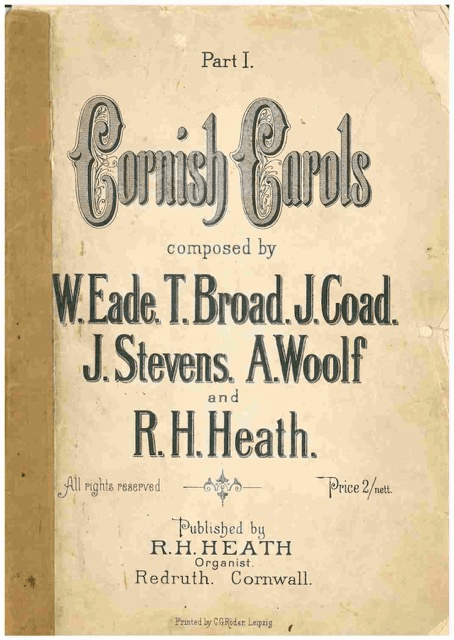I’m straying into an area where I admit I know little. But Christmas is the season for carols and Christmas carols are a distinctive element of traditional Cornish culture. The carols composed and sung in the Camborne-Redruth district were carried across the world by emigrants and turned up in places as far apart as California and Australia.
Thomas Merritt was the best-known composer of Cornish carols. Born in Illogan in 1863 in a mining family, Thomas left school when his father died. He was just 11 years old. He then worked on the surface at Carn Brea Mine and as a tin streamer at Tolvaddon. But, at around 18, Thomas, who was musically talented, received music tuition from another miner-musician, Henry Broad of Redruth, who was choirmaster at Redruth’s Primitive Methodist chapel.
Armed with this help, Thomas then began to teach music himself and became a chapel organist. He developed into a proficient and versatile composer, oratorios, cantatas, hymns flowing from his pen. But he’s best known for his carols. These have been described as being of a ‘fugal type of style’, one voice starting and then being repeated in another part of the choir. His carols have also been called ‘earthy’ and conservative.

The conservative aspect of Merritt’s carols should alert us to the fact that he was writing towards the end of a long-established tradition. When Cornish emigration was at its height – in the 1870s – Thomas Merritt had yet to start composing, but emigrant communities were already singing Cornish carols at Christmas.
Other less well-known working-class composers, such as Thomas Broad of Illogan or Willie Eade of Redruth, had been busy composing carols several decades earlier. In the 1820s and 30s Davies Gilbert and the dialect writer William Sandys both published collections of Cornish Christmas carols. These would have been sung by groups going around the town or village, the singers being rewarded with gifts of money or food and drink.
This carol tradition is usually linked to the rise of Methodism after the 1740s. This both validated and encouraged communal singing – of hymns and carols – beyond the church or chapel.
Yet the carol tradition in Cornwall may have an even longer pedigree, perhaps as far back as the period before the Reformation. William Scawen in the late 1600s wrote of the Cornish tradition of carols, which he speculated may have originally been sung in Cornish. He could have been right. For in 1508, when Cornish was still widely spoken, Elizabeth of York paid ‘to Cornishe [men/man?] for setting of a carolle upon Christmas day’.
A line of enquiry certainly worth following.
LikeLike
“What place is this?” asked Scrooge.
“A place where Miners live, who labour in the bowels of the earth,” returned the Spirit. “But they know me. See.”
A light shone from the window of a hut, and swiftly they advanced towards it. Passing through the wall of mud and stone, they found a cheerful company assembled round a glowing fire. An old, old man and woman, with their children and their children’s children, and another generation beyond that, all decked out gaily in their holiday attire. The old man, in a voice that seldom rose above the howling of the wind upon the barren waste, was singing them a Christmas song — it had been a very old song when he was a boy — and from time to time they all joined in the chorus. So surely as they raised their voices, the old man got quite blithe and loud; and so surely as they stopped, his vigour sank again.
LikeLike
Yes this is very true, part of his journey was on the old road that branches off to Pendeen and like a lot of old roads in Cornwall went up and over the top of a hill. This road has now been bypassed by one that skirts around the hill. On his journey down the western side of the slope he had full view of the lights of the mines mentioned in Christmas Carol. Told me by my father.
LikeLiked by 1 person
I’m starting to research William Broad (Gentleman of Paul) and Thomas Broad (of Illogan). After a superficial search unusually little genealogical data is obvious. Any clues would be appreciated.
LikeLike